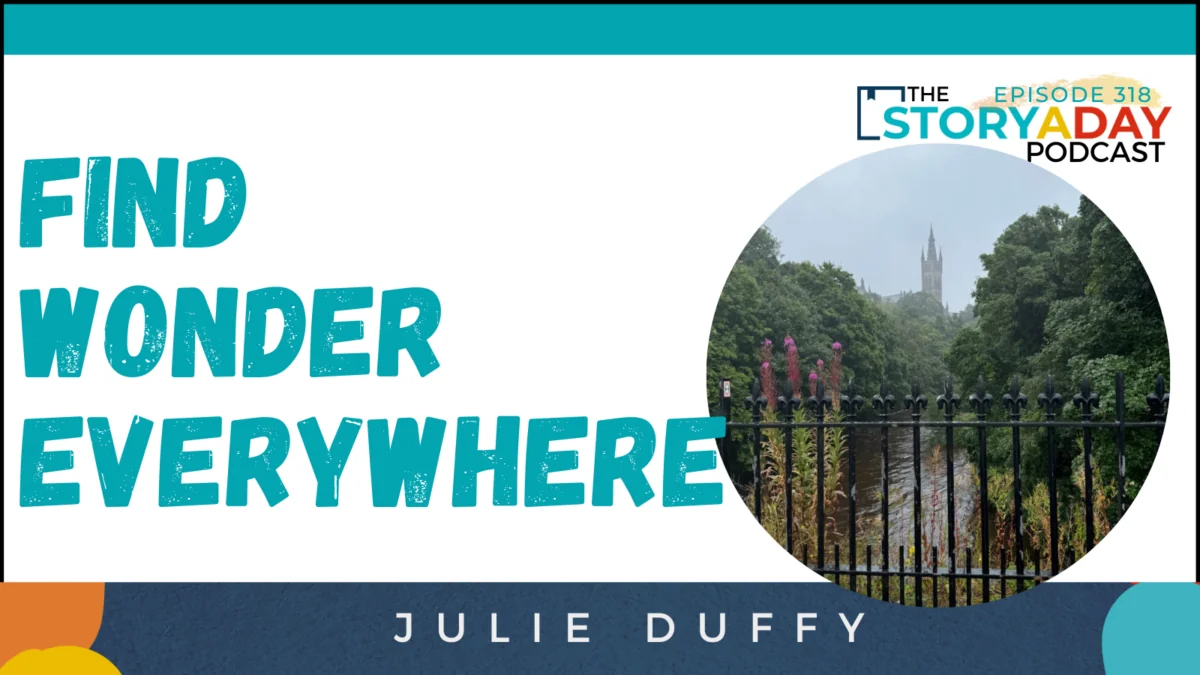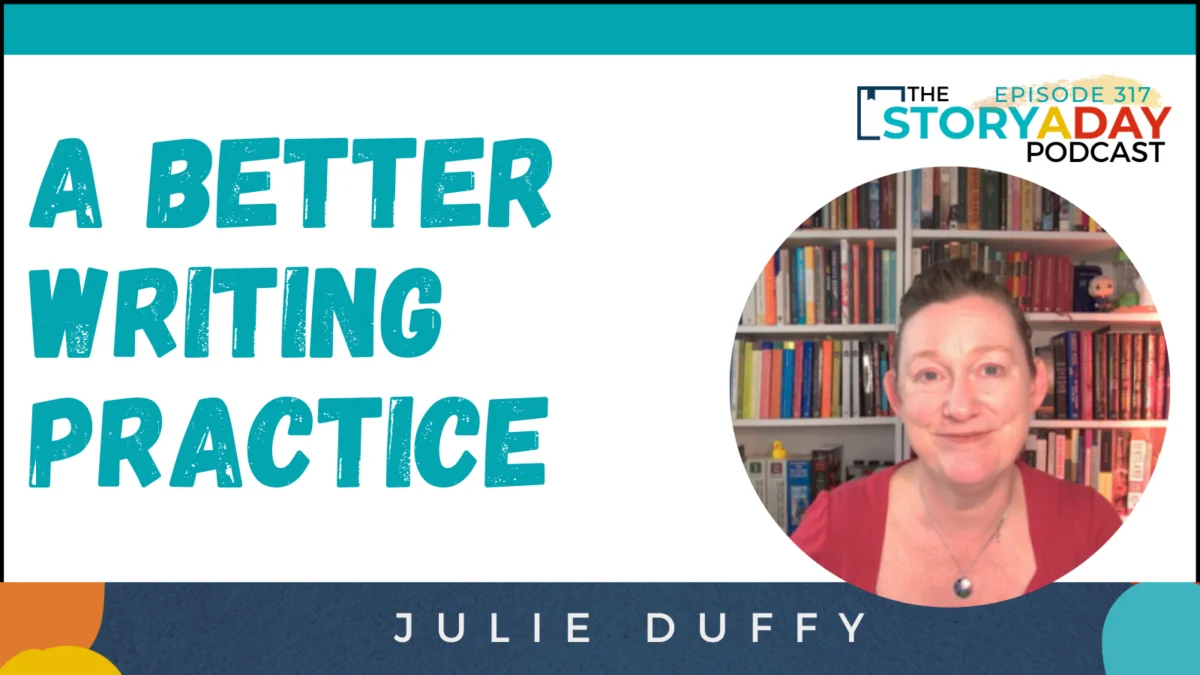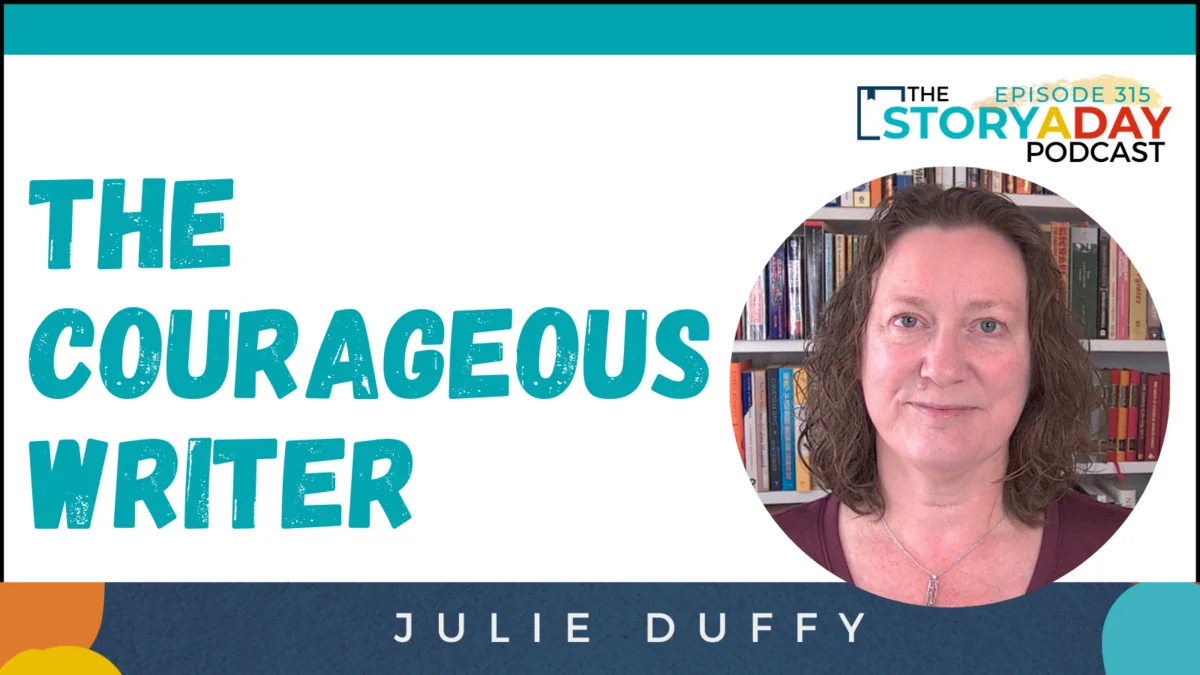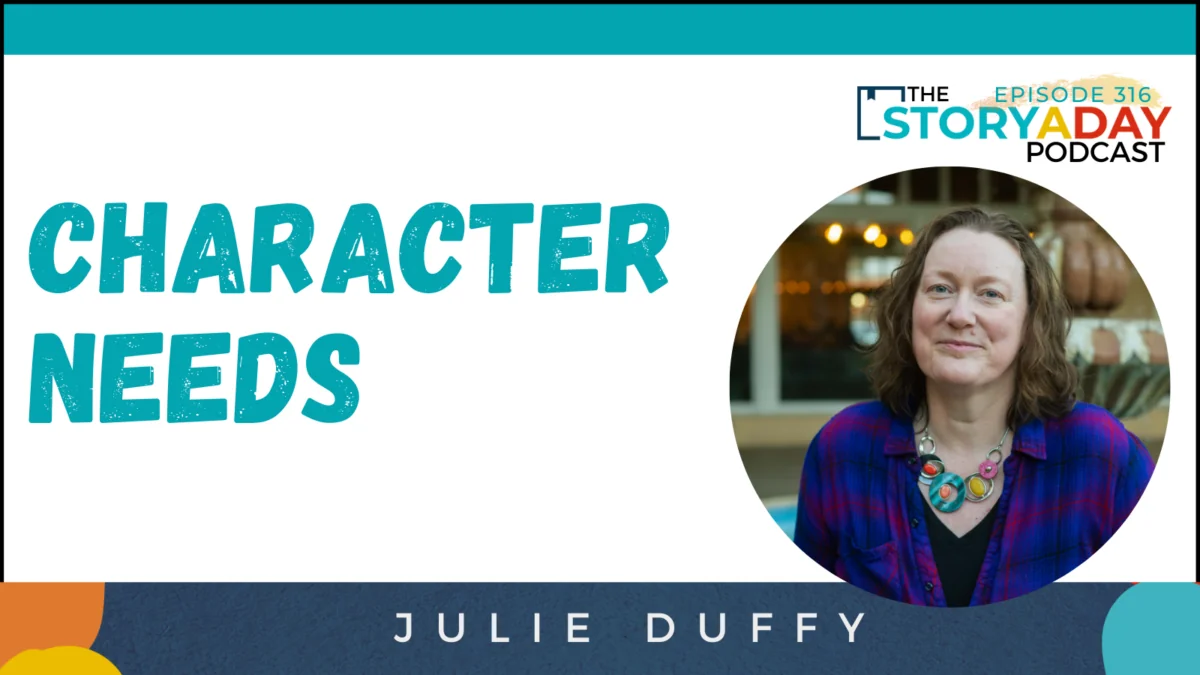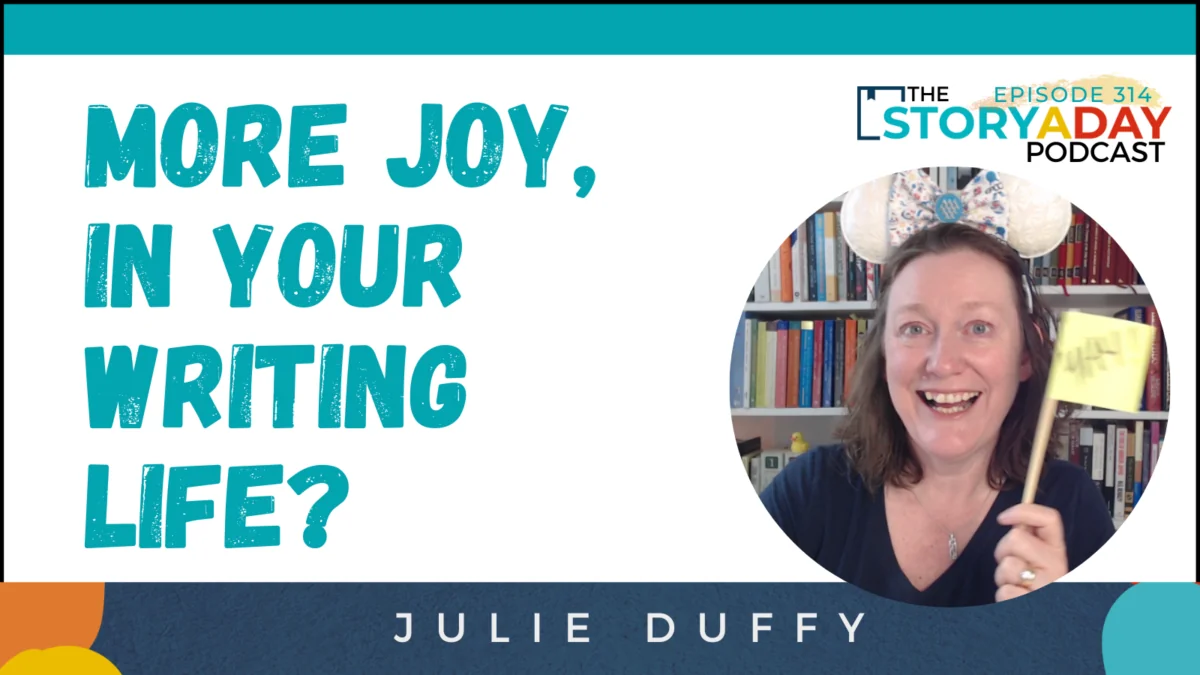In which I share revelations from my recent travels to Scotland, and talk about the importance of seeing the wonder in everyday life.
0:00 Find Wonder Everywhere
10:14 This Week’s Assignment
17:49 Your gift to the world
LINKS
Leave a comment: https://storyaday.org/find-wonder-everywhere
Handbook: https://storyaday.org/challenge-handbook
Other Help for Improving Your Writing Life
Download the Short Story Framework:
Take the 3-Day Challenge
Sign up for the StoryAWeek Newsletter
Take the I, WRITER Course
Join the Superstars Group
https://storyaday.org/superstars
Coaching with Julie
Transcript
318 Find Wonder Everywhere
[00:00:00] Good morning. Good evening. Good afternoon, Julie, from story a day here I am just back from my travels. I got to go to Scotland again last week to visit family for very happy reasons. My parents celebrated their 60th wedding anniversary. Congratulations, you guys.
[00:00:14] But I wanted to talk this week about. Something that comes very easily when you’re traveling and you’re in a new environment, which is seeing the wonder in everything, seeing the novelty in everything, seeing the world anew.
[00:00:31] It’s something that is easy to do when you’re away. It’s harder to do when you’re in your everyday routine.
[00:00:38] But I think that’s one of the gifts that we have as writers. We are endlessly curious. And sometimes we just need a little remainder to wake that curiosity up. And. I don’t know about you, but when I’m thinking about. writing a product, for example, writing a story that I want to send to a particular market. Or writing a novel for a particular audience or in a particular genre. It’s very easy to get overwhelmed by the expectations of the outcome. And to try and live up to our expectations.
[00:01:17] And that can take a lot of the fun. Out of the process of writing.
[00:01:22] Whereas.
[00:01:24] Discovering new stuff is really fun. And I’m going to encourage you to try and get some of the fun back into your writing by introducing some more fun into your life this month, this week, this month. And so for example, Last week, when we arrived at London Heathrow to change for our plane to Glasgow, we discovered when we turned on our phone and all the other phones on the plane beeped as well, Or at least half of them did, that’s our flight to Glasgow had been canceled and in their infinite wisdom, British Airways had decided that, . Telling us that we were going to rebooked on a flight. Two days, hence was an acceptable solution. So after some. Nervous laughter and a consultation with the people who they let us talk to.
[00:02:19] We weren’t allowed to talk to the actual help desk people, but the bouncers who were keeping us away from them. We said, what are we supposed to do? And they laughed and said, you could take a train. And we laughed because what else are you going to do? And said, I actually, you’re right,
[00:02:33] we could. So we did, because apparently you can just jump on the underground at Heathrow and go into the city and catch the train to Glasgow. So we did that. And it was great because we got to then instead of seeing the insides of Terminal Five and the jet way and another airplane and seeing, A little bit of London as we took off.
[00:02:53] And a little bit of Glasgow as we landed. We actually got to troll right through the middle of the country. We went up the west coast from London. We went up the west side of the country, of the UK. So skirting Wales and going through the industrialized north with their, the wonderful old factories and all brick chimneys.
[00:03:13] They’re few and far between though, but you still can see the origins of industrial revolution era towns nestled in river valleys. We got to see the flat pastoral land of the south of England. We got to see the hills of the Lake District, we got to see the forests of the Borders of Scotland. And then all of a sudden there we were, heading into Glasgow. In all its industrial revolution, era majesty and getting off at my, one of my favorite train stations, Glasgow Central, which is near and dear to my heart with soaring roofs, and just a hustle and bustle of people. And so it was a, it wasn’t a terrible outcome for us to have to take that. And as we were whizzing through the countryside.
[00:03:58] Every time I looked out of the window, it was a different landscape. So the reason I was thinking about that is that I was, following along with people who are heading to Glasgow this week for World Con, which is a big science fiction and fantasy convention, and somebody else was taking the train from London to Glasgow. And they posted a picture of their laptop screen on which they were watching the classic SciFi movie, The Matrix, and, Judgey McJudgerson here. I was just in my head I was just screaming, look out the window.
[00:04:29] Obviously you’re welcome to do whatever you want when you’re traveling And if watching The Matrix got them in the mood for their scifi con good for them. But I having just done the trip, I was like, ah, look out the window. You’re missing so much. And it does strike me as ironic actually that they were watching The Matrix and missing The real world going by on the window outside, but that’s, that’s a topic for another day.
[00:04:51] So what is what. What struck me. And then as I spent the next few days, visiting places that were both familiar and unfamiliar to me, because I grew up there. And I’ve been gone for a long time. I was appreciating things that other people weren’t even looking at. I was taking pictures of the purple loose strife, which is everywhere on the verges and the sides of rules on the sand dunes,
[00:05:17] At this time of year. It’s an upright green plant that grows in very dry conditions and it’s it’s a weed basically, and it’s gorgeous this purple flowers that break out everywhere and create great big swaths of purple in the land.
[00:05:32] And I was bending down and taking pictures of the low growing purple heather.
[00:05:37] And I was, listening to the seagulls and not seeing them as a pest because I just don’t see them very often anymore.
[00:05:45] And watching the patterns that the water makes in the edge, the wet edge of the sand as as the tide comes in and out. And as adults, we don’t always get time to stop and appreciate those kinds of things.
[00:06:01] And yet the people who do, people like the poet, Mary Oliver, people, poets in general… one of the reasons that people are drawn. To poetry is because there are people who make the choice to stop and look and observe and make connections between the running water and something in our everyday lives as writers.
[00:06:30] We need to actually create space and time.
[00:06:35] Too. Just be. In the world. And observe.
[00:06:40] And process. And noodle.
[00:06:42] And sometimes that means stepping away from product writing.
[00:06:48] In May, I encourage you to start and complete a story every day to get in the habit of creating complete works, things that can be turned into products, something for someone else to consume.
[00:07:01] But sometimes we just need to practice.
[00:07:03] I’ve been watching a lot of baseball this year. And , we see the players come out onto the field in their nice uniforms and their colorful socks and we see them step up to the plate once, once in a while.
[00:07:18] And then they go and sit down for a bit and it looks like a kind of an easy job, but if you watch what they do before the game, they turn up early. And the drill, they just stand there, whacking balls. They work out in gyms, they practice, sprinting, the practice throwing and catching, different different kinds of Keynes of throws different positions, different. place to try and catch different people out. None of that is on display for the audience. And yet if they didn’t do that work, what did show up at game time would be a sloppy mess. So we need to remember that sometimes going for a walk or a drive, or watching a, documentary or reading a non-fiction book or listening to a conversation someone else’s having in a coffee shop and then creating space to just noodle on that.
[00:08:16] Just doodle, just create little word salads for ourselves that aren’t necessarily part of the product that we are going to put out, is vital. This is a vital part of writing. Adding new words to a manuscript is wonderful. But celebrate the team that you spend
[00:08:39] doing things that feed your writing.
[00:08:42] My theme here at StoryADay this month is Triumph, and I’m going to be talking a lot about things to celebrate, both in your own writing in other people’s writing, in the writing world in general, in the reading world. Because that celebration of all the things that are good and the celebration of things that are curious and unusual and the connections that we can make, celebrating that stuff. Is what keeps us energized.
[00:09:15] It keeps us curious.
[00:09:17] If you can, this week, I am going to encourage you to try and vary your routine. Celebrate this world we live in and this existence we have. We don’t always feel like doing that. There’s plenty of bad in the world, and looking at that is important so that we can challenge it and fight it, but also celebrating the things that make us go, Ooh, Is really important as well.
[00:09:49] So this week I challenge you to very routine and find wonder wherever you are. You don’t need to get on a plane and travel to another country to see your world anew.. Take a new route home from work and really notice your surroundings.
[00:10:07] Go to a different grocery store and try and find all your usual stuff. See what they’ve got this different.
[00:10:14] This Week’s Assignment
[00:10:14] Wind your windows down on the way home and listen. Smell. Feel the air around here. Is it warm? Is it called? What smells can you smell better yet? Get an, a bike and cycle and remind yourself that travel doesn’t always need to be insulated and isolated from the world around you.
[00:10:37] Take off your headphones and listened to the world. As you walk through it.
[00:10:41] If you’re feeling brave, talk to a stranger. You don’t have to have anything interesting to say, ask them about themselves. Try to find out what it is that gets them excited. Try and find that one thing that lights them up. One guy I knew that the thing that lit him up was British empire era. armies And their equipment and their campaigns.
[00:11:03] And although I wasn’t terribly interested in them, it’s so fun to find somebody else’s passion and then step back and watch them late up. And as a writer, you get to watch how it changes their whole physicality when someone is talking about the thing they’re excited about.
[00:11:18] If you don’t want to talk to somebody order a different type of coffee in the coffee shop while you’re there listening to people and then try to describe The taste, the smell, the feel the The heat of it, in words on the page.
[00:11:35] Visit a museum that you have never been to since a school trip took you there, or since your last out of town visitor came.
[00:11:43] If you live in Middleton, Wisconsin, there’s a National Mustard Museum there. Have you been there?
[00:11:48] Another way that you can find wonder is to simply wander the Nonfiction. stacks at your local library and pull a book off the shelf. I did that recently and it was great fun.. It challenged me. And it sparked all kinds of ideas in my head, not entirely related to the content just related to sitting there reading.
[00:12:07] I just grabbed a book. Sat down at a table. And spent 15, 20 minutes leafing through the book, and thinking about the type of person it was intended for the type of person you would have to be to write this book. The type of person who would spend time creating the intricate diagrams that this book was explaining. Just grab any nonfiction book off the stack and leaf through it.
[00:12:35] You’re not attempting to learn anything, you’re attempting to spark your imagination.
[00:12:41] Or simply stop and look, as I did at the weeds. Growing on a free growing patch of earth Somewhere near you right now. How many different types of plants are there. Are there flowers. Are they tiny? Are they huge. How much dirt are they growing in? What kind of insects can you see in there? Are they growing up through the cracks in the pavement, how are they doing that? Are they growing in what used to be a pristine lawn? Why is it no longer pristine? What kinds of insects feed on these flowers? What if you were insect sized, what would you make of these weeds?
[00:13:23] So many questions will start to pop up in your head. Don’t repress any of them. You don’t need to create an, a thing from this. Once you have done this exercise , when you have gone out into the world and trying to find some wonder in it, come over to the blog and leave me a comment.
[00:13:43] I’ll leave the link in the. In the description of the podcast and you can come over. It speeds. It’s just storyaday.org/find-wonder-everywhere is link and leave me a comment and let me know how you find wonder or how you found wonder this week?
[00:13:59] I’m not encouraging you to come up with a different novel idea every day or a different short story idea every day, but just to help you come up with things that spark your imagination and a low you, a little space to play with words.
[00:14:18] If you have a copy of, or are signed up for the story of the challenge handbook from earlier this year. You’ll find 31 of these types of exercises in the warmup section of that. If you haven’t got hold of the challenge handbook, yet you can get that.
[00:14:35] now, at a discounted price. storyaday.org/challenge-handbook. Again, the link’s in the description. If you’re on your phone, open up your podcast app, as long as you’re not not driving and click on this episode and the little information button, and you’ll find the links in there. Click on those, go through and have a look at the handbook.
[00:14:54] So in the handbook, it’s it’s not actually a book, it’s a, an online site where you get videos and exercises from me. And there’s 31 short story prompts, but every one of those has an attached brainstorming exercise, which is directly related to helping you brainstorm the topic of the, Of the prompt, but each one also has a warmup exercise and I encourage you to throughout the year, open those up and pick one at random.
And I always say in those Warm-up exercises, set a timer for five minutes and just free-write and I give you a topic and it’s usually sparked by a memory of yours or a question. And it’s usually related to the topic of that day’s prompt, but you can use these individually any day of the year when you’re feeling like writing, and you don’t know quite what to write, pull up one of these warm-up exercises from the challenge handbook.
[00:15:51] And do this, this play practice. Intentional play, where you dive deeply into a memory or an emotion or an experience or a something you’ve seen or something you’ve touched and guided by me. And then just write, just play with words for five minutes. And I almost guarantee it will take you out of whatever anxiety you have from your daily life, from the project that you’re trying to work on and it will remind you why you love to play with language.
[00:16:33] It’s a commute for you. It’s a mental commute. But it’s also a serious business.
[00:16:39] I start a Story A Day because I was sick of seeing writing exercises, which were exactly this kind of play because they weren’t connected to anything. And I didn’t really understand the importance Of writing snippets about you or a memory from your childhood of going up the stairs or whatever it was.
[00:16:57] And I got frustrated because I would buy a book of those exercises and then I would just be like, okay, so I’m writing, but I’m not really writing anything. So when I started StoryADay May, I was like we’re going to, we’re going to write, but it’s going to be with a purpose.
[00:17:09] We’re gonna write stories. And we’re going to learn to start, get through the middle and finish stories everyday. And that’s been great and it’s absolutely has its place, but this year I decided with the handbook to bring back in some of that warmup work, some of that practice. And you can choose to do the warmup and the brainstorming and the short story on the same day, or you can just dip in and any time that you want to write, you just pull it up, open up one of those warmup exercises and spend a little time experiencing the world. In a way that we don’t get time to do when we’re just charging through it, trying to get all the things done.
[00:17:49] Your gift to the world
[00:17:49] What we do as writers is a gift to other people. We give them the gift of being able to take a little bit of time to slow down and experience the world in a different way in the way that our ancestors experienced it. At that slower pace that everybody says they want but don’t quite know how to give themselves. What we do at writers is generous And
[00:18:15] healing, and it takes a lot of work. It takes a lot of effort. And we might as well enjoy it as much as possible.
[00:18:23] So please this week, take up my challenge of taking some time every day to see the world in a new way, to pay attention to the details, to write those things down, to challenge yourself to play in a productive way with language and practice so that when you sit down to work on a particular project, that will turn into a product that you turn out into the world. You’ve got whole of this material banked inside your heart waiting to come out.
[00:18:58] That’s what I have for you this week. Check out the story at a challenge handbook. If you haven’t already it’s at storyaday.org/challenge-handbook. If you have checked it out already. And you have a copy, do yourself a favor and open it up this week. Pick one of the warmup exercises.
[00:19:17] Maybe do one a day. Maybe do one every three days. Do these exercises in addition to wandering through the world with your eyes wide open, breathing in all the smells and listening to all the sounds and touching all the things. And don’t forget to wash your hands. But most of all, keep writing.
[00:20:18] Thanks for listening. Why not come over to the blog at storyaday. org and check out this week’s writing prompts and articles. And in the meantime, have a great, creative week. And of course, keep writing.

